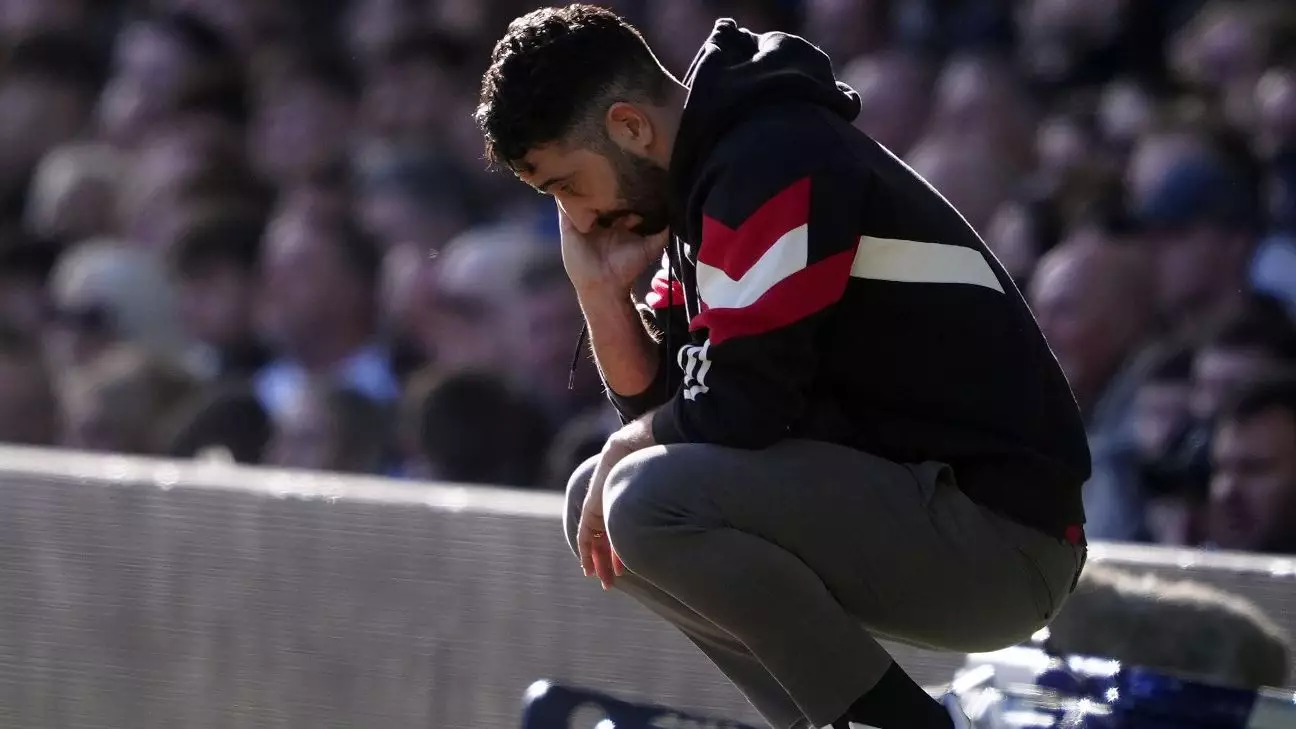In a world where the stakes are high and expectations soar, Ruben Amorim finds himself at the helm of Manchester United, grappling not only with pressure but with the raw reality of underperformance. Following a disheartening 2-0 defeat against West Ham, Amorim candidly expressed his precarious situation: he will not resign, yet acknowledges that if results do not improve, the decision may be taken out of his hands. His statements raise a critical question about the nature of leadership in the modern football landscape. Should a coach remain steadfast in the face of adversity, or recognize when the winds of change are necessary?
Amorim’s insistence on accountability is refreshing. He embodies a sense of responsibility that is all too often overlooked in football, where managers can be scapegoated for deep-rooted structural issues. His clear assertion that he understands the problems plaguing the squad demonstrates maturity and a commitment to his role, even as the chasm between ambition and achievement widens. “I have a clear idea what to do. I understand the problems of the team,” he states, highlighting both introspection and determination.
The Pressure Cooker of Priceless Potential
With United’s rough patch evident through their disappointing record of merely six wins in 26 league games since his appointment, the pressure on Amorim is mounting. These statistics palpably reflect a team grappling with identity and cohesion. Although he refuses to surrender his position in the face of adversity, Amorim’s focus shifts to upcoming critical fixtures—facing Chelsea at Stamford Bridge and the Europa League final against Tottenham. These matches are not merely contests but pivotal opportunities to prove that he can rally this beleaguered squad.
The financial implications of success cannot be understated. Winning the Europa League would earn the club a coveted spot in the Champions League, bringing a much-needed influx of funds. Yet, Amorim views this dual commitment with a critical eye, recognizing that the demands of competing both domestically and in Europe could strain an already fragile group. “We need more time with the team,” he notes, indicating an awareness that immediate fixes are often illusory. The question arises: is Amorim’s call for time an acknowledgment of systemic issues, or a sign of perhaps misplaced hope in his current squad?
Fan Expectations: A Double-Edged Sword
Fan expectation is a double-edged sword; it can fuel ambition but can just as easily overwhelm a team in turmoil. Amorim’s recognition of the fan base’s patience being on thin ice adds another layer of urgency to his situation. “It is going to be really tough and the patience of the fans and you guys next year if we don’t win is going to be on the limit,” he states. It’s compelling to parallel this remark with the broader trends in football, where loyalty and understanding can turn to discontent and demands for change in the blink of an eye.
As he gears up for his first full season in charge, Amorim seems to grasp that sustainability in performance is critical not just for his career but for the club’s health. He candidly admits, “We would have to be perfect to continue with everything. I know that.” The onus now lies not only on him but on the players to rise to the occasion. However, the essence of effective coaching often transcends mere tactical wizardry; it lies in fostering a mindset of resilience and growth amidst adversity.
The Quest for Stability and Success
As Amorim navigates this deeply turbulent period, his ability to spearhead a transition from struggle to stability could define his legacy at the club. While sources suggest that the management might still show faith in him irrespective of the Europa League outcome, the reality is stark: failure to capitalize on this season’s opportunities could potentially sever that faith. The essence of modern football often is a relentless cycle of short-term evaluations and immediate results. Yet, there exists potential in Amorim’s philosophy: that stability may arise from nurturing the right conditions to foster success.
Standing at a crossroads, Ruben Amorim embodies the perpetual challenge of leading a storied club like Manchester United. His struggles underline critical questions about reforming a squad, instilling confidence, and eventually, achieving results that fans and management alike crave. In the ruthless realm of football, it’s a delicate balance—a narrative of hope interwoven with the harsh demand for success.

